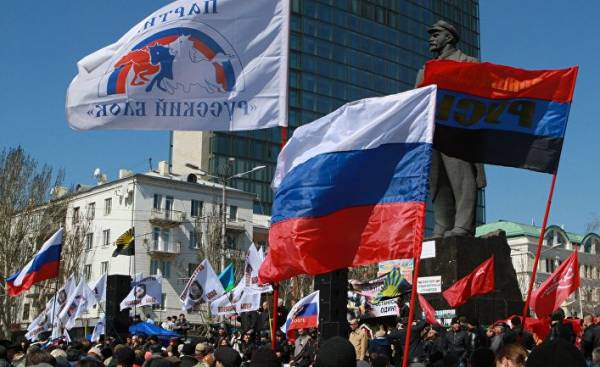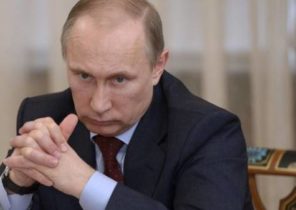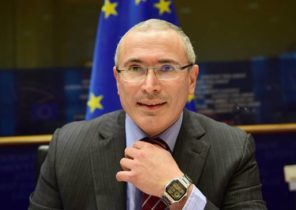
Blogger, columnist, political analyst Alexander Morozov familiar to anyone interested in events in Russia and throughout the former Soviet Union. It is known not only for their posts and publications, and performances at the Vilnius “Forums of free Russia”. After living several years in Prague, the journalist was moved to Vilnius, adding to the growing ranks of Russian emigrants.
This fact involuntarily carry us to the events of a century ago — the mass Exodus of the Russian elite after the October revolution of 1917. But Alexander Morozov disagrees: he sees the current situation more differences than similarities.
Alexander Morozov: did then it was a flight of enormous scale, hundreds of thousands of people, the educated stratum, the flight without the prospect of the return trip. The current wave of emigration is only partly caused by the persecution in Russia, there are many of those who went as economic migrants. The total may be just that for the last three years, i.e. since the beginning of the new Kremlin policy after 2014, the year (maybe even after the presidential election and the beginning of the third term of Putin’s presidency) there was abroad a lot of cultural figures who in one way or another under pressure in Russia. They take a clear stance against the political regime, support the opposition, support those who become victims of persecution. Here the similarity with the emigration of the first wave there, but it was small. If you remember these two previous waves of emigration, they created a major cultural institution: Russian Theological Institute in Paris, a very strong Russian Institute in Prague and at least a strong Russian presence in Belgrade. The current wave of defection…
LRT: more of a trickle…
The brook running from Putinism, Yes, he gave yet few institutional sites and centers. We watch closely: here in Prague already had such a venue — the new Russian festival “Cultures”, it’s been four years now, he has even received grants from the Ministry of culture of the Czech Republic as a Russian-Czech political and public festival. Or, say, a club in Berlin very well-known artist Dmitry Vrubel began to act as a permanent socio-political area with a good program. Here come the defenders of the writers — Vladimir Sorokin, for example.
— Information Agency “Medusa” in Riga?
— This is a very important cultural phenomenon, it is a small but powerful center of Russian journalism outside of Russia.
– “Forum of free Russia” in Lithuania are held two times a year, and it is also important.
Totally agree. I participated in all three forums in Vilnius, and it really is very important. There is in Berlin, the forum of Boris Nemtsov. The first time it was held last year and now in October again. This is also a very representative platform, where you are going and Russian public figures, and German, which is important…
And in Vilnius, the Russian and Lithuanian journalists, political…
— Yes, and MEPs. This is very important. Need to say a big thank you to the Vilnius and the politicians who have this phenomenon of patronage. I think, it is very hard, and I respect that. The existence of such a constant, even club grounds, in any format you need, in my opinion. Here in Warsaw, thanks to a civil activist Anastasia Sergeeva, a platform appeared: they’ve got the room and will work. Come to the European capital some interesting people, the possibility of a dialogue not only with Russia but also with European researchers, public figures, civil activists. I’d really like to Vilnius there is such a “House of free Russia”, though it is quite small: a small library, a small cinema, where you can show documentary films.
– I would like to think about the relationship between “new” Russian, came to us from Russia, and “old” Russian…
— In the three Baltic countries as a journalist I communicated with the “old” or local Russian. As a rule, they were men of culture and were generally tolerant and open enough to perceive the new wave that arose in his eyes. Especially since this emigration is small in any country, it is not a great competition to the “old” Russian. In Lithuania, for example, they know the Lithuanian language and are an indispensable communicators, messengers between cultures. None of the newcomers even in the foreseeable future will not compete with them, you will not be able to qualify for this position. In General, I see sympathy and friendly interest in the new emigration. Yes, of course, in the Baltic States is, and this is obviously a customized Pro-Kremlin Russian population, they like the nostalgic world of the Russian Empire, but, in my opinion, the vast majority of the Russian cultural environment of all Baltic States understands what Putin, especially in his last period, what form does the development of this so-called “Russian world”…
– What are your hopes for the youth, which was released in the spring in Moscow at the protests? Can we say that due to the fact that they are involved in the protest movement, that will change in the near future?
Is a dramatic question that all of us care about, and a big split of the social movement. Because some believe that nothing can change in the near future, others are pinning some hopes on these young people. If you ask me, I say: we have already seen that the prevailing mode, its tip (which is the fusion of the former secret services with the oligarchs and representatives of the Church) is extremely robust, cunning, and inventive power, which successfully manipulates people and even outside the country, manipulating public opinion, not without success. To expect that a social movement from below that power will sweep or force it to be transformed, is not necessary. It is seen that the tip is going to stand forever is going to constantly point repression to crush public protest for any reason, or to ignore it imaginatively, for example, compromising people participating in the protests, depriving them of their reputation. When it is hopeless to expect that the population in the broadest sense of the words is so wild, so reach the degradation of hunger…
– I repeat the events of a century ago, that is 1917…
— And hardly anyone wanted it. Because it will be trouble for the whole country and for the world, for tens of millions of people, for each family. That’s because in Russia such a difficult situation.
– Can we assume that all the new wave of people will move to Europe, because the people who are unable to live with it, but would not speak out, will be forced to leave.
— Of course. We see how the situation 10 years ago from Russia fled the marginal-the national Bolsheviks, the representatives of the small radical group, then went to “the bog”, and the last three years, we see that under pressure from the authorities leaving the largest economist Guriev — rector of the whole economic University. Under pressure leaving Timothy kulyabin, a talented young Director who staged “Tannhauser” at Novosibirsk. It forced Germany to leave. In our eyes there is pressure on the theater “Gogol-center”, which is already known, what will happen to its leader Cyril Serebryannikova. Pressure is not confined to the leaders of political movements, but people are quite rooted status. Degrading the government conducts a policy of cultural unification. Under the pretext of some “moral responsibility” to curtail the freedom of creativity: you have some reason you can not put a play about Rudolf Nureyev in the Bolshoi theater!
Writer Boris Akunin has gone abroad, not because he was being chased by someone, did not allow him to write and publish, he simply gasped for breath, he needed oxygen of creative freedom…
— Yes, it is. Every time we see like a single episode, but it turns out that he is part of the infinite list. That’s forced out of the country a wonderful young programmer Pavel Durov, take business away from him some efesbank, he’s off to London, opens a new case. Now there is such a battle for history, for historical science, what you can expect from this wild atmosphere, ideological dictatorship, which imposed as a dogma, the best historians give up and leave for European universities to teach. And rightly so, it is impossible to talk to people: let us fight and fall all in the fight against this terrible bureaucracy!
– Minister of culture of Russia said that history is not a science… And here is 100 years of the Bolshevik October revolution, but no one is discussing, not arguing, not evaluate the event. But stubbornly the fore the figure of Stalin. There is a version that this is, in part, the protest phenomenon: people say that he gave the order, all were poor, bad, but it was a great power, and now all stolen by the corrupt officials.
— Yes, this idea develop several journalists and political analysts, but it seems to me incorrect. Stalin rises slowly over a long period, almost imperceptibly. It is known that the frog is cooked in boiling water slowly, and not immediately notice. The figure of Stalin has come to the fore in the mid-naughties, when choosing the “Name of Russia”, and for the first time it suddenly went so high. The Kremlin took the theme of Stalin at the Communist party rather late and now gradually, easily, not aggressive with her playing. And want it because Putin has made a very strong choice with the Crimea. He reversed the policy towards the Soviet Imperial ambitions. Remember his humorous words to the child: “we Have a boy, borders, everywhere.” Began expansion of the “Russian world” on the surrounding Europe. And it demanded a return to the ideology of the Stalinist: “we Have to hand the big world, our interests everywhere.”
– Not speaking about the Baltic States.
Yes. When Putin came to power, the first six years of his entire propaganda elite wanted it to relate to the enlightened time of Alexander the Third: a good reasonable policy with all the countries all settled, the economic recovery… But in the ten years of his reign moved out to this noble idea to Stalin and his aggressive stance cynical, treacherous game of deceit. Remember, Churchill asked Stalin: “where 35 thousand poles who were on the territory of the USSR, where did they go?” Stalin thought a moment and said: I don’t think they went through Manchuria.
– And those who died in Katyn…
— Yes, it is Katyn. Putin’s style in the same vein. In response to the question “did you do it?” — answer: “I don’t know, that knows someone there…” And all. Exactly the same game. As for the Russian population, whether it is repression of bureaucracy? This issue is discussed a lot. Insidious was the headline recently in “Moskovsky Komsomolets” — “Putin with the people against the snickering of power.” As if there is some separate from him “the power” that is “snickering” and he fights it… It’s a terrible design and who knows where it will lead. You might think about this on the example of Donbass. This is the image of the future Russia. That is, in fact, Putinism as if prisasyvaet Russia to the level of Donbass today. That is, that had the same atmosphere: some murky people with murky backgrounds have got control over what is unclear and rewrite itself on the property… Such Crimean-Donbass atmosphere to them… there is culture involved in the great Patriotic war, on this mythology, the glorification of the past, in full conflict with the West and with all the world around. Of course, it’s disappointing, because Donbasskaya of the Russian Federation is a pretty scary prospect. But, by the way, there is nothing unreal, because quietly, unnoticed, the degradation can bring the society to this state.







